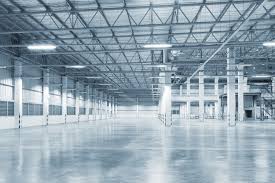It is bard to imagine Stephen Schwamnan, Blackstone's highsociety boss, talking as passionately about the nitty-gritty of logistics as Mr Moghadam (who has a fraction of Mr Schwarzman's wealth). Yet a contest between the king of warehouses and the baron of private equity will be worth watching. It will not just shape the future of e-commerce. It will change the urban landscape, too.
很難想象黑石集團的高層老板斯蒂芬·施瓦姆南會和穆加達姆先生(他擁有的財富是施瓦姆南先生的一小部分)一樣,在談?wù)撈鹞锪鞯谋举|(zhì)時,十分激動。然而,倉庫之王和私人股本巨頭之間的競爭將值得關(guān)注。它不僅將塑造電子商務(wù)的未來。它也將改變城市景觀。

To see why, cycle, as Schumpeter did last weekend, up London's Lea Valley, an idyll of canal boats and riverside vegetable gardens running from the graffiti-covered East End to the capital's north. Stop at the Ravenside Retail Park, a place of shuttered stores like Mothercare, a well-known British brand, and Maplin, an electronics retailer. It is destined to become ground zero for the retail apocalypse. In January Prologis spent £51n ($68m) acquiring the site, just before covid-19 accelerated the agony of its remaining tenants. In a few years, once they, or their leases, expire, Prologis hopes to turn the area into a multistorey warehouse for e-commerce firms like Amazon. That is part of a global pattern. In America such logistics hubs are rising from the rubble of dead shopping malls.
為了弄清原因,像熊彼特上周末那樣,騎自行車沿著倫敦利阿谷向上行駛,從涂鴉覆蓋的東端到首都北部,是一片運河船只和河畔蔬菜園的田園風光。在Ravenside零售園停下來,這里有很多關(guān)閉的店鋪比如英國知名品牌Mothercare以及電子商品零售商Maplin。它注定會成為零售業(yè)末日的起點。今年一月,就在新冠疫情加劇了剩余的租賃店鋪的痛苦之前,Prologis斥資5100萬英鎊(合6800萬美元)收購了這個地方。幾年后,一旦他們或他們的租約到期,Prologis希望把這個地區(qū)變成像亞馬遜這樣的電子商務(wù)公司的多層倉庫。這是全球格局的一部分。在美國,這樣的物流中心正從廢棄的購物中心廢墟中崛起。
It is easy to dismiss the warehouse business. As one industry boss puts it, investors used to think of it as "four walls and a roof that you hope doesn't leak"-in other words, highly commoditised. Yet Mr Moghadam says it is enthralling. The first task, he says, is to decide on which end of the supply chain to be. He settled on mass consumer markets around the world rather than serving producers, because, as he puts it, "Consumers do not move, factories do." As a result, his warehouses sit close to huge urban areas where land is scarce. It also requires patience. In America it has taken decades for e-commerce to eke out a double-digit share of retail spending. Lockdowns have turbocharged the shift. Before the pandemic about a fifth of Prologis's warehouse construction was for e-commerce, and the rest for other forms of logistics. The e-commerce share is now as high as 40%, Mr Moghadam says.
人們很容易會不考慮開展倉庫業(yè)務(wù)。正如一位行業(yè)老總所言,投資者過去認為這是“四堵墻和一個你希望不會漏水的屋頂”——換句話說,高度商品化。然而,穆加達姆表示,倉庫令人著迷。他說,第一項任務(wù)是去決定為供應(yīng)鏈的哪一端服務(wù)。他在全球范圍內(nèi)建立了大眾消費市場,而不是為生產(chǎn)商服務(wù),因為正如他所說,“消費者不會移動,工廠會”因此,他的倉庫就坐落在土地稀缺的大城市附近。這也需要耐心。在美國,電子商務(wù)花了幾十年時間才在零售支出中占據(jù)兩位數(shù)的份額。 封鎖措施這種轉(zhuǎn)換加速。在疫情之前,Prologis將自己大約五分之一的倉庫建設(shè)用于電子商務(wù),其余用于其他形式的物流。穆加達姆表示,目前電子商務(wù)的份額高達40%。
譯文由可可原創(chuàng),僅供學習交流使用,未經(jīng)許可請勿轉(zhuǎn)載。












